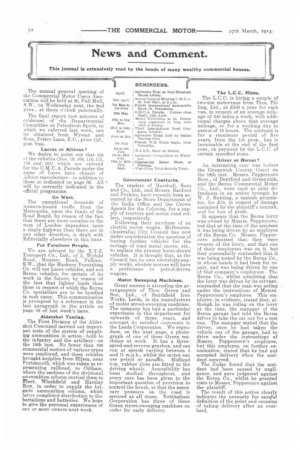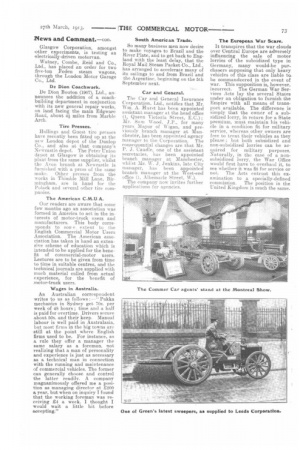News and Comment.
Page 10

Page 11

If you've noticed an error in this article please click here to report it so we can fix it.
This journal is extensively read by the heads of many wealthy commercial houses.
The annual general meeting of the Commercial Motor Users ,.kssoelation will be held at 89, Pall Mall, S.W., on Wednesday next, the 2nd prox., at three o'clock punctually.
The final report (not minutes of evidence) of the Departmental Committee on Petroleum Spirit, to which we referred last week, can be obtained from Wyman and Sons, Fetter Lane, E.C., price lid., post free, Lacres or Albions?
We desire to point out that six of the vehicles (Nos. 19, 109, 110, 111. 116 and 164) which are entered for the C.M.U.A. Parade under the name of Lacre have chassis of Albion manufacture— in addition to those so indicated on page 66. All will be correctly indicated in the official programme.
Go West.
The exceptional demands of western-bound traffic from the Metropolis, upon the funds of the Road Board, by reason of the fad that there are more counties to the west of London dependent upon a single highway than there are in any other direction, is dealt with Editorially elsewhere in this issue.
For Furniture People.
We are advised by the X.Y.Z. Transport Co., Ltd., of 3, Wyfold Road, Munster Road, Fulham, S.W., that the Hackney Furnishing Co. will use Lacre vehicles, and not Berns vehicles, for certain of its work in the future, by reason of the fact that lighter loads than those in respect of which the Berna Co. specializes are to be handled in such cases. This communication is prompted by a reference. in the last paragraph in the article on page 48 of last week's issue.
Aldershot Testing.
The First Divieion of the Aldershot Command carried out important tests of the system of supplying ammunition in action—both to the infantry and the artillery—on the 19th inst. No fewer than 100 commercial motors of various types were employed, and these vehicles brought supplies from Hilsea, near Portsmouth, which was taken as representing railhead, to Odiham, where the sections of the divisional ammunition column carried them to Fleet, Winchfield and Hartley Row, in order to supply the brigade ammunition column, which latter completed distribution to the battalions and batteries. We hope to give the personal experiences of one or more owners next week. Government Contracts.
The tenders of Marshall, Sons and Co., Ltd., and Messrs. Barford and Perkins, have recently been accepted by the Store Department of the India Office and the Crown Agents for the Colonies, for a supply of tractors and motor road rollers, respectively. Following their purchase of an electric motor wagon, Melbourne, (Australia) City Council has now under consideration the question of buying further vehicles for the cartage of road metal stores, etc., to replace the present horse-drawn vehicles. It is thought that, as the Council has its own electricity-eupply works, electric motors will have a preference to petrol-driven wagons.
Motor Sweeping Machines.
Great success is attending the arrangements of Thos. Green and Son, Ltd., of Smithfield Iron Works, Leeds, in the manufacture of motor street-sweeping machines. The company has had a particular experience in this department for upwards of three years, and amongst its satisfied customers is the Leeds Corporation. We reproduce, on the next page, a photograph of one of these Green machines at work. It has a threespeed-and-reverse gearbox, and can run at speeds varying between 4 and 11 m.p.h., whilst the motor can use petrol or paraffin. Midland 4-in, rubber tires are fitted to the driving wheels. Accessibility has been studied throughout, and every care has been given to the important question, of provision to control the brush, so that the necessary pressure on the road is secured at all times. Nottingham Corporation has three of these Green street-sweeping machines on order for early delivery. The L.C.C. Hires.
The L.C.C. is hiring a couple of two-ton motorvans from Thos. Tilling, Ltd., at 1;500 a year for each van, in respect of an average mileage of 240 miles a week, with additional charges above that average mileage, or for a working day in excess of 12 hours. The contract is for a maximum period of five years, from the 1st prox., but is terminable at the end of the first year, on payment by the L.C.C. of certain specified sums.
Driver or Owner?
An interesting case was before the Greenwich County Court on the 19th inst. Messrs. Peppercorn Bros. of Deptford and Greenwich, and Ate Berna Commercial Motor Co., Ltd., were sued as joint defendants in an action brought by W. J. Bunting, a taxicab proprietor, for 218, in respect of damage sustained by the plaintiff's taxicab, and for loss of profit. It appears that the Berna lorry was owned by Messrs. Peppercorn, but that at the time of the accident it was being driven by an employee of the Berna Co. Messrs. Peppercorn admitted that they were owners of the lorry, and that one of their employees was on it, but they successfully contended that it was being tested by the Berna, Co., in whose hands it had been for repair, and was being driven by one of that company's employees. The Berna Co., whilst admitting that the lorry was driven by its servant, contended that the man was acting under the instructions of Messrs. Peppercorn's employee. This employee, in evidence, stated that, although he was riding on the lorry at the time, the manager of the Berna garage had told the Berna driver to take the car out for a test run. The manager stated that the driver, once he had taken the vehicle out of the )garage, had to drive under the instructions of Messrs. Peppercorn's employee, but this employee, on further examination, stated that he had not accepted delivery when the accident occurred.
The Judge found that the accident had been caused by negligence, and gave judgment against the Berne Co., whilst he granted costs to Messrs. Peppercorn against the plaintiff. The result of this action clearly indicates the necessity for careful definition of the point and occasion of taking delivery after an overhaul. Glasgow Corporation, amongst -other experiment, is testing an -electrically-driven motorvan. liVatney, Combe, Reid and Co., Ltd., has placed an order for two five-ton Foden steam wagons, through the London Motor Garage Co., Ltd.
De Dion Coachwork.
.De Dion Bouton (1907), Ltd., announces the addition of a coachbuilding department in conjunction with its new general repair works, on land facing the main Edgware Road, about 4 miles from Marble Arch.
Tire Presses.
Hollings and Guest tire presses have recently been fitted up at the new London depot of the Dunlop Co., and also at that company's Newcastle depot. The Peter Union depot at Glasgow is obtaining its plant from the same supplier, whilst the Avon branch at. Newcastle is furnished with a press of the same make. Other presses from the works in Thimble Mill Lane, Birmingham, are in hand for the Pola-ck and several other tire companies.
The American C.M.U.A.
Our readers are aware that sonic few months ago an association was formed in America to act in the interests of motor-truck users and manufacturers. This body corresponds to son e extent to the English Commercial Motor Users Association. The American association has taken in hand an extensive scheme of education which is intended to be applied for the benefit of commercial-motor users. Lectures are to be given from time to time in suitable centres, and the technical journals are supplied with much material culled from actual experience, for the benefit of motor-truck users.
Wages in Australia.
An Australian correspondent writes to us as follows :—" Pukka mechanics in Sydney get 70s, per week of 48 hours ; time and a half is paid for overtime. Drivers secure about 50s. and their keep. Manual labour is well paid in Australasia, but most firms in the big towns are -still at the point where English firms used to be. For instance, as a rule they offer a manager the same salary as a foreman, not realizing that a man of personality and experience is just as necessary as a technical man in connection with the running and maintenance of commercial vehicles. The former can generally choose and control the latter readily. A company magnanimously offered me a position as managing director at ENO a year, but when on inquiry I found that the working foreman was receiving Le a week. I thought I would wait a little bit before accepting." South American Trade.
So many business men now desire to make voyages to Brazil and the River Plate, and to get back to England with the least delay, that the Royal Mail Steam Packet Co., Ltd., has arranged to accelerate many of its sailings to and from Brazil and the Argentine, beginning on the 5th September next.
Car and General.
The Car and General Insurance Corporation, Ltd., notifies that Mr. Wm. A. Hurst has been appointed assistant manager at the head office
Queen Victoria Street, E.C.); Mr. Sam Wood. J.P., for many years Mayor of Wigan, and previously branch manager at Manchester, has been appointed agency manager to the Corporation. The consequential changes are that Mr. P. J. Caudle, one of the assistant secretaries, has been appointed branch manager at Manchester, whilst Mr. W. J. Jenkins, late City manager, has been appointed branch manager at the West-end office (1: Albemarle street, W.).
The company now invites further applications for agencies. The European War Scare.
It transpires that. the war clouds over Central Europe are adversely influencing the sale of motor lorries of the subsidized type in Germany, many would-be purchasers supposing that only heavy vehicles of this class are liable tobe commandeered in the event of war. This supposition is, however, incorrect. The German War Services Acts lay the several States under an obligation to furnish the Empire with all means of transport available. The difference is simply that the owner of a subsidized lorry, in return for a State premium, must maintain his vehicle in a condition fit for military service, whereas other owners are free to treat their vehicles as they please ; but both subsidized and non-subsidized lorries can be acquired for military purposes. Naturally, in the case of a nonsubsidized lorry, the War Office would first have to overhaul it, to see whether it. was fit. for service or not. The Acts entrust this examination to a specially-defined commission. The position in the United Kingdom is much the same.
























